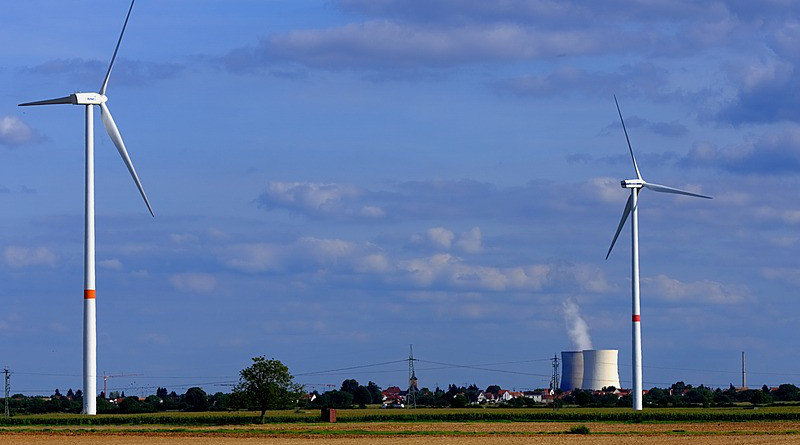EU To Table ‘Climate Taxonomy’, Leaving Gas And nuclear For Later
By EurActiv
By Frédéric Simon
(EurActiv) — The European Commission plans to delay a decision on whether to label nuclear and natural gas power plants as a sustainable investment under green finance rules due to be published next week, according to a leaked document seen by EURACTIV.
The EU executive is due to publish on 21 April the first section of its “sustainable finance taxonomy,” a long list of economic activities plus the specific rules they must meet to be labelled as green investments in the EU.
The rules, spelled out in a “Taxonomy Climate Delegated Act”, set out detailed green finance criteria for undisputed low-carbon technologies like renewables but leaves out gas and nuclear power for a separate decision to be take at a later stage by EU member states and the European Parliament.
Gas and nuclear have proven the most contentious issues in the debate on green finance, with countries in eastern and southern Europe threatening to veto an earlier draft because it did not label gas as “green” or “transition” investments.
France, meanwhile, said it would fight to make nuclear recognised as a green technology under the EU’s sustainable finance rules. “This is a real political fight,” said French economy minister Bruno Le Maire who stressed “the determination of France” to get a green investment label for nuclear power under the taxonomy.
Two-step approach
By putting forward a separate proposal for gas, nuclear and other “transition” activities later this year, the Commission is effectively throwing the hot potato to EU member states and the European Parliament, acting as co-legislators.
“The Commission intends to put forward a separate legislative proposal in Q4 2021, specifically covering how certain economic activities, primarily in the energy sector, contribute to decarbonisation,” says a draft Commission proposal obtained by EURACTIV.
According to the EU executive, “this will bring clarity to the debate” and allow legislators to follow up on the December summit where EU leaders acknowledged the role of natural gas as a “transition technology” in the fight against climate change.
The Commission last month suggested labelling some gas plants as green, under strict conditions, when they replace coal in power generation. But that proposal satisfied neither side, nor the EU’s own green finance advisers, who urged Brussels to resist political pressure to weaken the rules, saying their credibility is at stake.
From the Commission’s viewpoint, leaving the decision to the European Parliament and EU member states “will have several advantages”.
“On the one hand, it will allow a transparent debate by co-legislators on the contribution of natural gas and nuclear technologies to the decarbonisation objectives, respecting the right of Member States to determine their energy mix in an appropriate way. On the other hand, it will clarify to investors in a timely manner how such investments should be treated from the perspective of environmental considerations,” says the Commission’s draft document.
Among environmentalists, the two-step approach is seen as a pragmatic response to take the heat out of the debate and move forward with the less controversial aspects of the taxonomy.
“Postponing the discussion on fossil fuels is a political necessity at this stage, due to the fossil fuel lobbies’ enormous pressure on the Commission to greenwash their activities,” said Henry Eviston, WWF spokesman on sustainable finance.
“However, the EU must quickly clarify that fossil fuels are not green. Full stop. The Green Deal’s credibility is at stake here,” he said.
Forestry and bioenergy
According to the WWF, the Commission should remove fossil fuels fully from the taxonomy and postpone the discussion on bioenergy and forestry in order to have more time to devise criteria that are scientifically credible.
EURACTIV understands the EU executive is planning to include forestry and bioenergy in the first batch of implementing rules due to be tabled On 21 April. It will then update the taxonomy criteria on forestry and biomass after the next revision of the Renewable Energy Directive, which is expected to be tabled in June.
Bioenergy is particularly sensitive for Nordic countries, who rely on biomass for a large share of their renewable energy consumption.
“Forestry and bioenergy criteria have moved from being science-based to being Sweden-based, and should therefore be postponed in order to produce criteria that are scientifically credible,” Eviston said.
In the European Parliament, views are sharply divided. Earlier this month, a group of MEPs led by former Polish prime minister Jerzy Buzek, called on the European Commission to recognise the role of gas as a transition technology. The letter was signed by 80 MEPs across five different political groups.
But the Greens and socialists others are strongly against the move. “We’ve been outspoken that we didn’t want to have the fossil gas included in the taxonomy,” said Paul Tang, a Dutch lawmaker in the European Parliament for the Socialists and Democrats (S&D). “That is really at odds with the science-based approach and not the way forward,” he told EURACTIV.
Regarding nuclear, Tang said the S&D group “is mainly biased against nuclear at this stage” because of the issue of nuclear waste.
“For us, the needs to be science-based so it would be very odd to have nuclear included. It’s a bit like fossil gas, if there are long-lasting effects on sustainability, how can it be included?” he said.
The Commission’s in-house scientific body, the Joint Research Centre, released its much-awaited report on nuclear power on 2 April, saying it should qualify for a green label under the taxonomy.
Two expert committees will now scrutinise the JRC’s findings for three months before the Commission takes a final decision.
According to Tang, “the Commission has created a complex process” on nuclear, with different bodies to advise its decision. “So we await that process and we’ll see what happens but I don’t think that will change our position,” he told EURACTIV.

